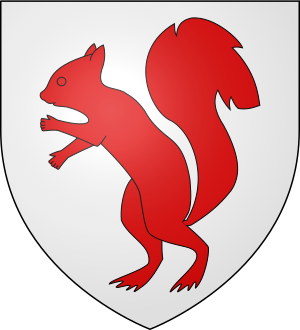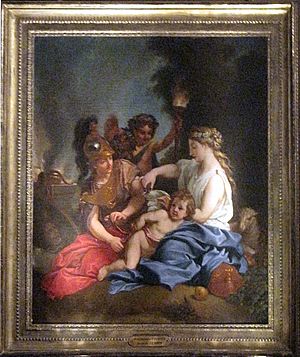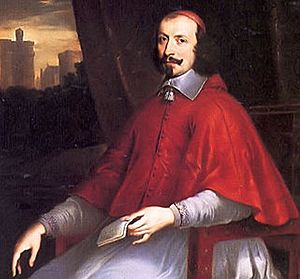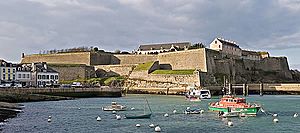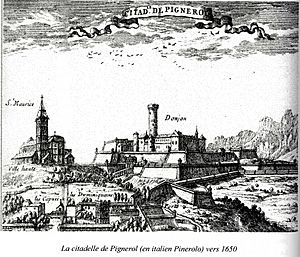Nicolas Fouquet facts for kids
Quick facts for kids
Nicolas Fouquet
|
|
|---|---|
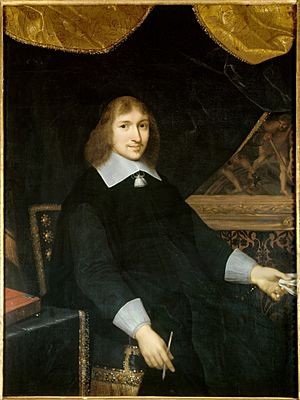
Portrait by Charles Le Brun
|
|
| Born | 27 January 1615 |
| Died | 23 March 1680 (aged 65) Pignerol
|
| Nationality | French |
| Known for | Superintendent of Finances in France |
| Signature | |
Nicolas Fouquet (born January 27, 1615 – died March 23, 1680) was a very important person in France. He was the Superintendent of Finances for King Louis XIV from 1653 to 1661. This meant he was in charge of all the country's money. He became very rich and powerful. However, he later lost the king's trust. He was accused of misusing state money and acting against the king. King Louis XIV had him put in prison in 1661, where he stayed until he died in 1680.
Contents
Early Life and Family
Nicolas Fouquet was born in Paris into a powerful family. His family belonged to the noblesse de robe. These were noble families who held high government jobs, especially in law and finance. Nicolas's father, François IV Fouquet, had many important government roles. His mother, Marie de Maupeou, was known for being very religious and kind.
Even though the family was noble, they actually came from cloth merchants in Angers. Nicolas's father later became very wealthy as a shipowner. He was noticed by Cardinal Richelieu, a powerful minister, who gave him important government jobs. In 1628, his father joined a company that helped colonize French islands.
Fouquet's family was very religious. They wanted Nicolas to become a priest. Out of his 11 brothers and sisters who grew up, all 5 girls became nuns. Among the boys, 4 became priests or bishops. Only Nicolas and his brother Gilles did not join the church.
Nicolas went to school with the Jesuits when he was 13. He later earned a law degree from the University of Paris. Cardinal Richelieu even advised him on his career path.
Political Career and Rise to Power
In 1634, Fouquet became a councilor in the Parliament of Metz. Richelieu gave him the job of checking if Charles IV of Lorraine was taking money that belonged to the King of France. Fouquet, still a teenager, did this job very well. In 1636, when he was just 20, his father bought him the job of maître des requêtes for a large sum of money. In those days, many government jobs could be bought.
In 1640, he married Louise Fourché, who was rich and well-connected. He received a large dowry from this marriage. Sadly, Louise died in 1641 at age 21, shortly after giving birth to their daughter. Fouquet was 26 years old.
Cardinal Richelieu died in 1642. But Fouquet managed to impress Richelieu's replacement, Cardinal Mazarin. Mazarin became his supporter. From 1642 to 1650, Fouquet held various important roles, first in the provinces and then with Mazarin's army.
In 1648, Fouquet was named the general intendant of Paris. This was just when the second Fronde started. The Fronde was a series of civil wars in France. Fouquet bravely helped Mazarin and the Queen Mother, Anne of Austria, to protect the monarchy. Because of this, Mazarin and Anne of Austria always trusted and supported him.
These high-level jobs made him well-known at court. In 1650, he was allowed to buy the important job of procureur général for the parlement of Paris. This made him one of the most important people among the noblesse de robe.
Fouquet's wealth grew even more when he married 15-year-old Marie-Madeleine de Castille in 1651. She also came from a rich and powerful family. Fouquet had five children with her.
During Mazarin's time away from France during the second Fronde, Fouquet stayed loyal to him. He protected Mazarin's belongings and kept him updated on what was happening at court. When Mazarin returned, Fouquet was rewarded. He became the Superintendent of Finance on February 7, 1653. He was the youngest person to ever hold this job.
At this time, France's finances were in a terrible state. King Louis XIV's many wars and his spending habits caused this. Also, only about half of the taxes collected actually reached the king's treasury. The rest was taken by others. Fouquet was in charge of deciding which funds to use to pay the state's debts. He also negotiated with the rich financiers who lent money to the king.
Fouquet tried to make the government more trustworthy for lenders. But the system had little control. The long wars and the greed of the courtiers often forced Fouquet to borrow money using his own good name. He worried about ruining his family and friends who helped him lend money to the crown. In 1658, he tried to resign, but Mazarin did not accept it.
The royal accounts were very messy, which was common at the time. Fouquet had a plan to fix the finances, but he never put it into action. Instead, things continued as usual. Many dishonest deals happened, and financiers were kept happy with special favors. Meanwhile, ordinary people paid the price for this financial mess.
When Mazarin died on March 9, 1661, Fouquet expected to become the chief minister. But King Louis XIV was suspicious of Fouquet's loyalty and his ambition. The king decided he would be his own chief minister. Jean-Baptiste Colbert, who wanted Fouquet's job, told the king bad things about Fouquet. He reported on the country's debt and made Fouquet look bad.
However, Fouquet had some protection. His high job at the parlement meant only the Parlement could put him on trial, and he controlled much of it. Also, what Fouquet was doing was not always illegal. Even Colbert later said that Fouquet "managed to conduct his robbery while keeping his hands clean."
Vaux-le-Vicomte Estate
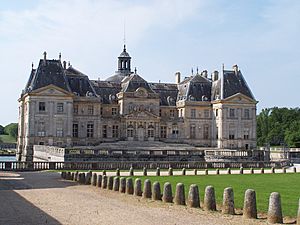
In 1641, when he was 26, Fouquet bought the land of Vaux-le-Vicomte. It was about 50 kilometers southeast of Paris. He spent huge amounts of money over 20 years building a magnificent castle there. This castle was so grand that it was like a preview of the famous Palace of Versailles.
Fouquet hired the best artists and designers for Vaux-le-Vicomte. He brought together the architect Louis Le Vau, the painter Charles Le Brun, and the garden designer André le Nôtre. King Louis XIV later hired this same team to build Versailles.
At Vaux and his other properties, Fouquet collected rare books, paintings, jewels, and old artifacts. He also surrounded himself with famous artists and writers. People like Jean de La Fontaine, Pierre Corneille, and Madame de Sevigné were often invited to his home. Some of them even received his support.
These very expensive displays of wealth made the king even more unhappy with Fouquet.
Overseas Activities
In 1638, Fouquet received some shares in the Company of American Islands from his father. He also became an early investor in other companies that explored and traded overseas. After his father died in 1641, Fouquet took over the family's interests in French colonies like Senegal and New France. His family also had strong connections in maritime trade in Brittany.
Over many years, Fouquet worked to make these family strengths even bigger. He actively supported French colonization and wanted to make the coast of Brittany a major center for sea trade. He made friends with important people in Brittany. He bought many armed ships and started building military-like defenses, seemingly without telling the king.
As part of this plan, Fouquet bought Belle-Île-en-Mer in 1658. This was an island off the coast of Brittany. He made the island's defenses stronger and built a port and warehouses. He also fortified another island called île d'Yeu. These were huge building projects. The king was so worried that he sent a spy to Belle-Île-en-Mer. The spy reported that Fouquet had 200 soldiers, 400 cannons, and enough ammunition for 6,000 soldiers. Fouquet planned to use Belle-Île as a safe place if he ever fell out of favor with the king.
The king's concerns grew even more when he found out Fouquet had ordered several warships from Holland. These ships could have helped Fouquet's colonial plans or even been a hidden threat to the king. Also, Fouquet secretly arranged for someone else to become the Viceroy of the Americas, without the king knowing.
Arrest of Fouquet
On August 17, 1661, King Louis XIV was a guest at Fouquet's castle, Vaux-le-Vicomte. Fouquet threw a huge party for the king. It included a play by Molière, a fancy meal served on gold and silver plates, fireworks, and a ballet. The king was amazed by all this luxury.
Some people say this party was the reason Fouquet was arrested. But King Louis XIV had already been planning to get rid of him since May and June 1661. The party's extreme luxury only made Fouquet's situation worse. It showed how incredibly rich he was compared to how poor the king's treasury was.
The king was also worried about Fouquet's large network of friends and supporters. This network made Fouquet one of the most powerful people in France. The king was only 22 years old and was afraid to act openly against such a strong minister. When he was a child, Louis had seen civil wars during the Fronde. He had good reasons to worry about rebellions. As Superintendent, Fouquet was in charge of the very rich and powerful tax collectors. If the king challenged them, it could cause serious trouble.
Using clever tricks, Fouquet was convinced to sell his job as procureur général. This made him lose his protection from the king's prosecution. He gave the money from the sale (about 1 million livres) to the king's treasury, hoping to gain favor. At the same time, he had made a recent mistake. He tried to hire one of the king's mistresses as a spy. She refused his money and told the king everything.
After his visit to Vaux, the king announced he was going to Nantes. He asked his ministers, including Fouquet, to go with him. On September 5, 1661, Fouquet was leaving a meeting, feeling confident that the king liked him. Suddenly, he was arrested by D'Artagnan, a famous musketeer. It is said that Fouquet was completely surprised because he thought he was in the king's good graces. He was first imprisoned at the Château d'Angers.
Trial and Imprisonment
Fouquet's trial lasted almost three years. Many parts of the investigation and trial were unfair, even for the 1600s. For example, the officials investigating him worked directly for Jean-Baptiste Colbert, Fouquet's enemy. The trial was held in a special court where the judges and lawyers were chosen by Colbert. They were known to dislike Fouquet and support the king. Also, the trial was written down, and Fouquet, who was a good speaker, was not allowed to speak in his own defense.
However, some of the accusations against Fouquet were supported by evidence he found hard to deny. One key piece of evidence was the 'cassette of Saint Mandé'. This was a box found after his arrest, hidden behind a mirror in his estate near Paris. The box contained secret documents. These documents showed a defense plan written in 1657, when Fouquet was having problems with Mazarin. The plan was updated in 1659. It told his supporters what to do if he was arrested, including taking up arms. It also mentioned a naval operation.
The main accusations against Fouquet could lead to the death penalty. They were:
- Misuse of public funds: This included taking large amounts of the king's money, getting payments from illegal rents, lending money to the king while also controlling public spending, and using royal treasury funds for himself.
- Actions against the king: This included buying Belle-Île without the king's permission, corrupting royal officers, and having conflicts of interest with important members of the king's court.
During the trial, many French people felt sorry for Fouquet. Famous writers like Jean de La Fontaine and Madame de Sévigné wrote to support him.
On December 20, 1664, the judges gave their verdict. Out of 22 judges, 13 voted for banishment (being sent away from the country), and 9 voted for the death penalty. The king was unhappy with this decision, as he thought it was too light. So, he changed the sentence to life imprisonment at the fort of Pignerol and took all of Fouquet's property. He also started to punish Fouquet's friends, supporters, and family.
In December 1664, Fouquet was taken to the prison fortress of Pignerol in the Alps. He stayed there in harsh conditions until he died in 1680.
It is said that Eustache Dauger, the man known as the Man in the Iron Mask, served as one of Fouquet's servants there. However, the connection between Fouquet and the Man in the Iron Mask is still debated. Fouquet's wife was not allowed to write to him until 1672. She was only allowed to visit him once, in 1679. Fouquet handled his imprisonment bravely. He spent his time translating texts and writing religious works.
Death of Fouquet
Official records say that Fouquet died in Pignerol on March 23, 1680. His son, the Count of Vaux, was with him when he passed away. No death certificate was made, but he is believed to have died from a stroke after a long illness. He was first buried in the local church, Saint Claire de Pignerol. However, a year later, his body was moved to the unmarked family tomb in the Église Sainte-Marie-des-Anges in Paris.
Fouquet in Stories
Fouquet's story is often linked to the Man in the Iron Mask. This mysterious prisoner is sometimes thought to be the true king or even Louis XIV's identical twin brother.
Fouquet is a main character in Alexandre Dumas' novel The Vicomte de Bragelonne. In this book, he is shown as a hero. Aramis, one of Fouquet's friends, tries to take power by replacing Louis XIV with his twin brother. But it is Fouquet, out of loyalty to the king, who stops Aramis's plan and saves Louis. However, this does not prevent Fouquet's downfall.
Several films have been made based on Dumas's novel:
- In James Whale's 1939 film The Man in the Iron Mask, Fouquet is shown as the main villain. He tries to keep the king's twin brother a secret. Joseph Schildkraut played Fouquet.
- In the 1977 version, Patrick McGoohan played Fouquet.
- In The Fifth Musketeer (1979), Ian McShane played him.
- Most of these films show Fouquet dying in the 1660s, which is different from real history.
Fouquet was played by Robert Lindsay in Nick Dear's play Power.
Fouquet's life and his rivalry with Colbert are part of the story in the historical novel Imprimatur by Rita Monaldi and Francesco Sorti.
Fouquet and his arrest are also important in Roberto Rossellini's 1966 film The Taking of Power by Louis XIV. Pierre Barrat played Fouquet in this movie.
In the second of Peter Greenaway's Tulse Luper films, a Nazi general named Foestling becomes obsessed with Fouquet. He tries to live out Fouquet's life and death.
Fouquet is mentioned, but not by name, in an episode of HBO's The Sopranos. A character compares someone to King Louis's finance minister who tried to be grander than the king and ended up in prison.
See also
 In Spanish: Nicolas Fouquet para niños
In Spanish: Nicolas Fouquet para niños
 | William L. Dawson |
 | W. E. B. Du Bois |
 | Harry Belafonte |


